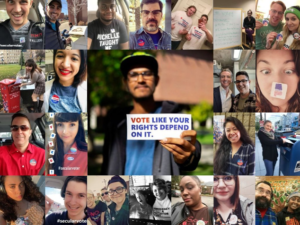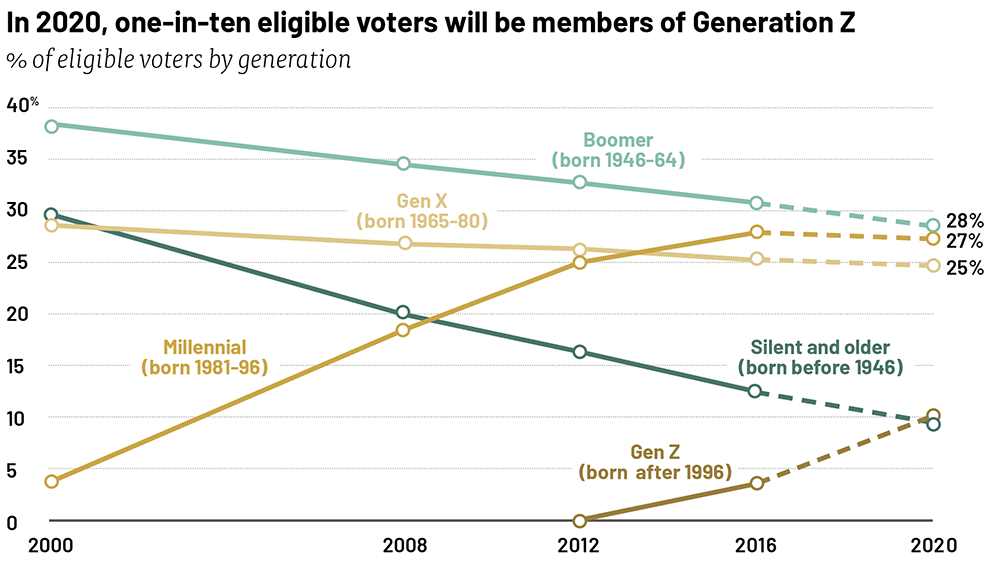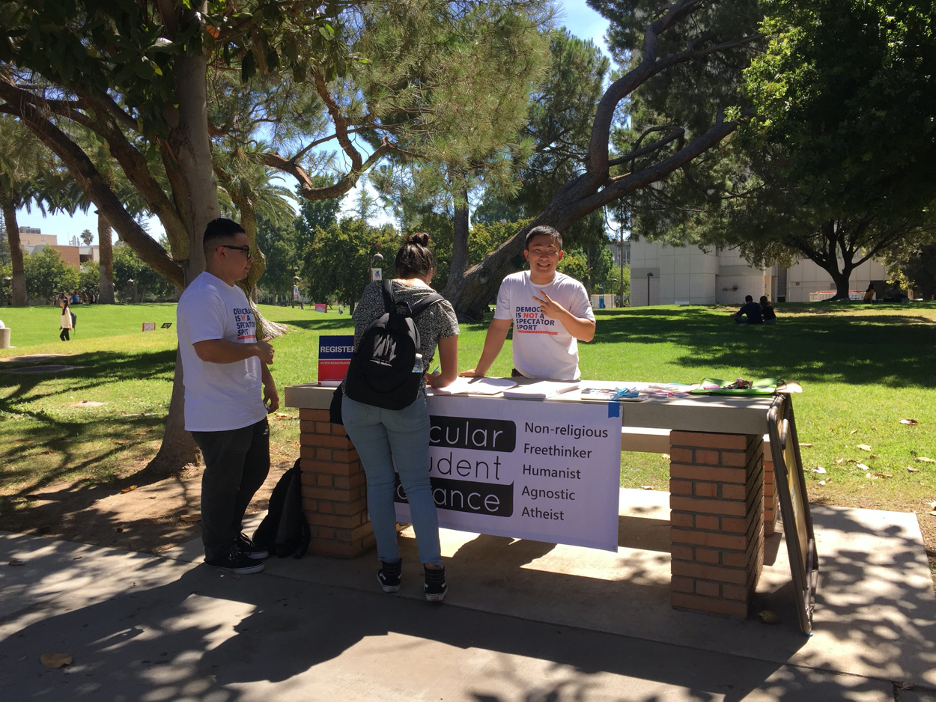Secular America Takes Action Today, So They Can Vote Tomorrow
 Secular America Votes participants in 2018
Secular America Votes participants in 2018 Here in the US, a secular voting bloc could have powerful potential to influence local and national elections. Recognizing that fact, in 2018 Secular America Votes (a joint project of the Secular Student Alliance and other member organizations of the Secular Coalition for America) set out to engage the secular electorate in voter registration and civic engagement efforts. Secular groups across the country hit the ground to register voters in their community and on their campuses. Voter registration efforts are a great non-partisan way to provide an essential service to your community while familiarizing people with your local secular group, and to help instill the idea that the secular community is good without a god. Secular America Votes (SAV) is back for 2020 and ready to get to work registering voters and ensuring a safe and fair presidential election.
We’ve been anticipating the 2020 US presidential election since the moment 2016 results were clear. When Donald Trump officially filed his reelection campaign with the Federal Election Commission on the day of his inauguration, January 20, 2017, his opposition filled the streets, showing with their bodies the turnout voters intended to bring to the next election. All this to say, we saw a contentious, unprecedented election in our future. We saw the massive mobilization to register and engage voters in the 2018 midterms, and we expected even more mobilization on this front for 2020.
What none of us saw coming was a global pandemic that would fundamentally alter nearly every aspect of our way of life, including the foundation of our democracy—our right to vote.

Note: Eligible voters are U.S. citizens ages 18 and older.
Source: Data from 2000 to 2016 from Pew Research Center analysis of 2000 decennial census and 2008. 2012 and 2016 American Community Survey (IPUMS). Date for 2020 from Pew Research Center projections of the electorate based on U.S. Census Bureau 2017 population projections. PEW RESEARCH CENTER
“Being able to vote is a privilege that many of our ancestors fought for, and we owe it to ourselves to have a voice in the legislative process that will affect all of us,” says Carolyn Najera, a voter awareness intern at the Secular Student Alliance (SSA). “Voting is an essential check onpower,” she adds, “and therefore it is vital we make it accessible within our communities to have a say in their own government.”
In the upcoming election, we thought the barrier to overcome would be getting complacent voters to the polls and engaging more of the electorate in the democratic process. Now we lack clarity on how our state governments will conduct voting in the fall. Canceled and botched primaries have rightfully instilled fear about the safety and security of our elections. Lining up at the polls (something that has been such an integral part of the voting process) is no longer safe amidst a global health pandemic. So, what are we to do?
We must act now to ensure the path to voting is safe and accessible. Every American should have the option to request a vote-by-mail ballot. Offering a vote-by-mail option will cut down on the number of people who vote in person on Election Day (November 3), dramatically reducing the health risk for those who for whatever reason have to vote in person or who are working at the polls. Some states have taken swift action, allowing COVID-19 to meet the disability requirement to request an absentee ballot. Moreover, vote by mail is already an established practice; 23 percent of ballots in 2016 were mail-in and six states have already committed to holding all-mail elections in 2020: Hawaii, Utah, Oregon, Washington, Colorado, and California. Changes to our electoral process on this scale will require intensive preparation on behalf of states and municipalities, which is why it’s imperative that we act swiftly and encourage Congress to pass a stimulus bill with the necessary support for a fair 2020 election.
We know we’ll face opposition along the way. Advocacy groups connected to the religious right have turned to their well-worn playbook in claiming religious exemptions to pressure local and state governments to ease stay-at-home restrictions imposed by the coronavirus pandemic. With such groups already flouting evidence-based research on when it’s safe to reopen businesses and hold large indoor gatherings, we must anticipate their opposition to common-sense election reform during this time.
The 2020 election marks an interesting transition in the makeup of our electorate. While baby boomers are slowly becoming a smaller portion of it, Gen Z (those born in the mid-to-late 1990s through to the early 2010s) will make up one in ten eligible voters in the upcoming election.

Secular Students register voters at Cal State University Northridge in 2018
However, students may be at a particular disadvantage. If they want to vote at their campus address, they may be unable to do so in the fall if their school hasn’t reopened. Additionally, college campuses are often the place where young people get their civic knowledge and where they’re offered opportunities to register to vote. It’s unclear if and how campuses will conduct voter registration efforts if students aren’t physically on campus in the fall.
It’s vital that we account for student voices in all stages of our voter engagement efforts. “Working on the SAV project is an honor,” says Najera, the SAV intern who is also a current college student. “Especially now when fear is running rampant and many are left with unanswered questions, organizations like [SSA] provide necessary information to the public free of charge and with no agenda but to promote a better tomorrow and make sure everyone has access to an equal and fair voting process.”
We must also address potential barriers for members of Gen Z who will have to navigate their first voting experience amidst a pandemic. In California’s recent special election to replace former Rep. Katie Hill (D) in the 25th Congressional District, 56 percent of voters sixty-five and older returned their mail-in ballot compared with 19 percent of those thirty-five and younger. (Incidentally, Republican Mike Garcia beat Democrat Christy Smith; both will likely run for a full term in November.)
We must anticipate and take action to ensure this significant voting gap along generational lines isn’t perpetuated in the 2020 election. We must find creative solutions to mobilize the millennial and Gen Z electorate to not only vote, but to do so by mail.
Advocating quickly for universal vote by mail is an essential first step, but it isn’t the only step we need to take. We must recognize, for example, that a vote-by-mail election may potentially disenfranchise certain voters, such as Native Americans, whose communities often have poor mail service. We must also ensure there are needed resources for polling sites and poll workers to safely conduct in-person voting.
Secular America Votes set out as a voter registration campaign, but we now know it needs to be even more than that. We will continue to provide resources for secular organizations to host in-person voter registration drives, with the hope of a return to normalcy that will allow such drives to take place. However, we’re also closely monitoring the impact COVID-19 is having on the 2020 election and providing timely and effective strategies for engagement. We invite you to sign up for Secular America Votes updates so we can keep you informed.
Ready to take action? We’ve crafted some impactful actions that we can all take during this time.
- Check your own registration status. If we do move toward vote-by-mail elections, it’s going to be even more important that people are registered at the correct address so that they can receive their ballot.
- Contact your members of Congress and let them know you support vote-by-mail initiatives. Tell Congress to expand voting access.
- Email your friends, family, and secular community. Make sure they’re registered and understand what actions they can take today to advocate for vote by mail and election safety.
- Read our “How to Host a Voter Engagement Drive” guide and start preparing for hosting drives in late summer and fall when things reopen. Register your drive and request materials at secularamericavotes.org.
- Host a virtual registration drive by directing people to our user-friendly Voter Engagement Portal (bit.ly/every1vote) where they can:
- Register to vote
- Check registration status
- Request an absentee ballot (if currently allowed in their state)
- Sign up for election reminders
- Pledge to register if between the ages of thirteen and seventeen
- Sign up for updates so you can receive our forthcoming “Guide to Hosting a Virtual Registration Drive.”
- Let us know how you’re taking action in your community and how we can amplify your efforts! Email us at sav@secularstudents.org.
Let’s band together and not let disenfranchisement be the story of this election. Take action today—let’s show that secular America votes!
Secular America Votes is a joint project of American Atheists, the American Humanist Association, Black Nonbelievers, the Center for Inquiry, the Freedom From Religion Foundation (FFRF), the Secular Coalition for America, and the Secular Student Alliance. Thank you to FFRF for sponsoring the Voter Awareness Intern position.
